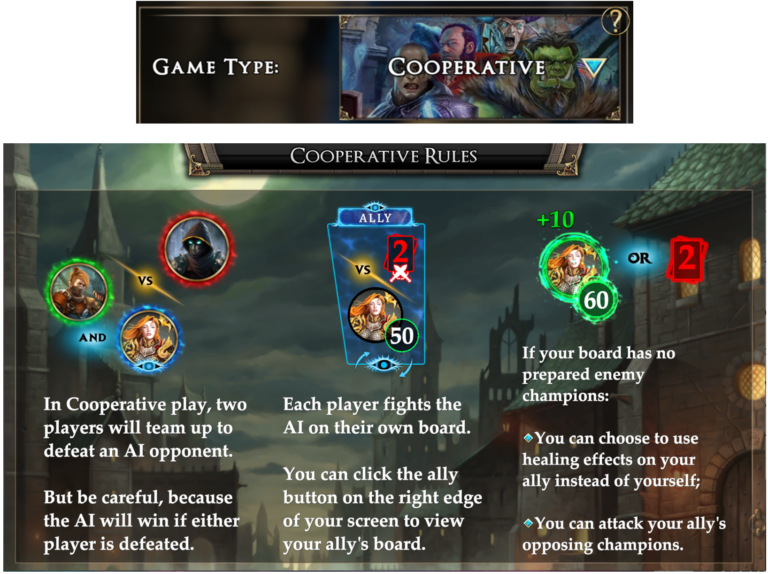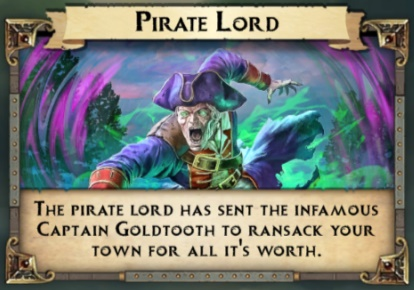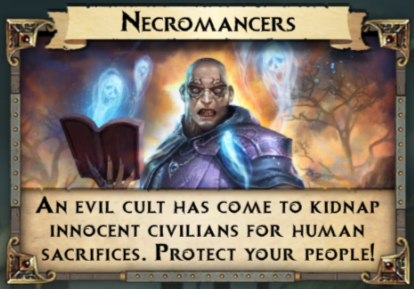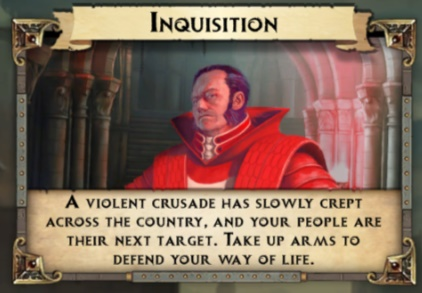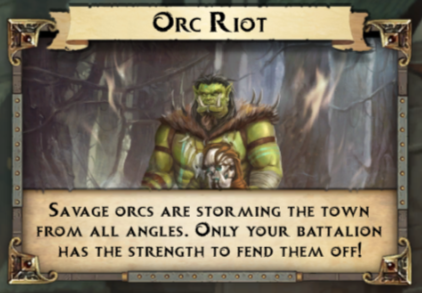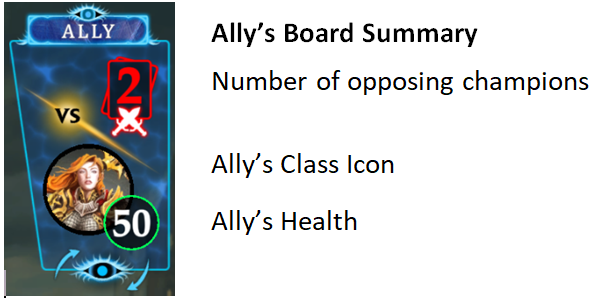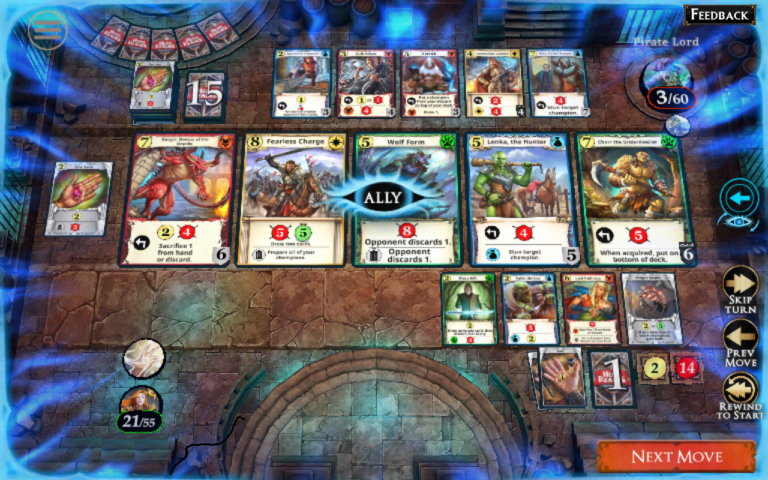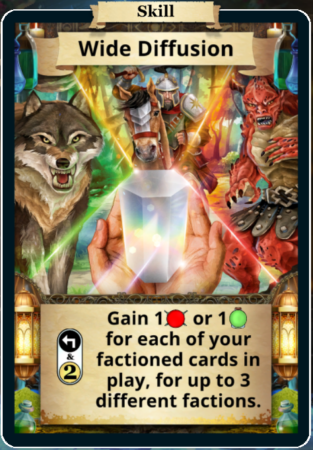While cooperative matches are more forgiving to mistakes or poor choices than Player vs Player matches, team work is still needed, and expected. This article covers the basics of cooperative games, provides an overview of each scenario, and tips on how to be an effective teammate.
Basics
The Cooperative Game Type allows two players to team up against an AI opponent in one of four scenarios. Cooperative play has similar features to Player vs. Player matches: Game Timing as Real Time or Async (48 Hour Turns) and random queue matching or Challenge another player. A description of the cooperative mode can be found by tapping on the ? at the top right of the Cooperative selection.
Scenario Overviews
Pirate Lord (Levels 1-3)
The AI’s deck is a mix of gold, Marauder champions, and damage cards. The AI can generate significant damage in a single turn with multiple Broadside action cards or Captain Goldtooth/Marauder combinations.
AI Skill: Acquire the cheapest card of cost 4 or lower in the market row for free
Key Cards: Captain Goldtooth (Elite Champion), Capsize
Player Strategy: Acquire a mix of damage and defense cards from the market, maximize faction benefits.
Necromancers (Levels 4-6)
The AI’s deck is mainly comprised of champions, damage cards, and sacrificed cards. The player’s chances of winning decrease around Turn 40 because the AI’s skill builds healing and attack point generation to significant levels.
AI Skill: Gain 2 health and 1 attack for each time deck has been shuffled (1st reshuffle: 2 health, 1 attack, 2nd reshuffle: 4 health, 2 attack, etc.)
Key Cards: Varrick & Rayla combo, Sacrifice cards
Player Strategy: Stun opposing champions to keep AI’s deck from cycling too quickly. Address Varrick/Rayla combination ASAP, the AI’s extra card draws will quickly overrun a player.
Note: AI opponent does not acquire market cards.
Inquisition (Levels 7-9)
The AI’s deck is centered around healing and card draws. Inquisition will heal, so dealing minor damage to the boss early is often ineffective.
Scenario Skill: All item cards for each player have all factions
Key Cards: Kraka, Word of Power, Expansion
Player Strategy: Acquiring damage actions or champions is key since Inquisition heals often. Acquiring Imperial cards will counter Inquisition’s Expansion cards. Aggro builds may be able to quickly overwhelm the AI opponent. By Turn 40 the Inquisition’s card acquisition and healing will decrease players’ chance of winning, so players cannot slow build their decks.
Orc Riot (Levels 10-12)
The AI’s deck is a mix of Orc champions and damage cards.
AI Skill: Players choose between taking 3 damage or discard a card at the beginning of each turn
Key Cards: Rampage, Flesh Ripper (Elite Guard Champion)
Bug: If forced to discard a card from a card or ability, then choosing ‘Discard a card’ at beginning of turn will mean only one card to discard instead of taking 3 damage and still having to discard from the card/ability.
Player Strategy: Teamwork to manage opposing champions and player health while building deck with market cards.
Note: AI opponent does not acquire market cards
In Necromancer and Orc Riot scenarios the AI opponents don’t acquire cards from the market, you can leave cards for your ally to acquire and thereby maximize faction abilities.
Cooperative Play
Since the defeat of either player will result in a loss, teamwork is important. One common mistake is not aiding your ally when the opportunity is available. Helping a Wizard ally or ones using Elf or Smallfolk ancestry is especially important due to the lower max health. At the start of each turn, check your ally’s health and number of opposing champions. Does your ally need help? If so, what type of help: healing or dealing with opposing champions? The answer to these questions should influence the order of your play.
To be able to help your ally you must first either expend or stun your opposing champions. If your ally needs healing, then you need to play damage cards first to clear opposing champions before using healing cards or abilities.
Understanding the pace of the game is another important aspect because different actions are needed based on how close, or far, you are from the end of the match.
- 2-18 turns – Quick Match
- 20-40 turns – Average Match
- 40+ turns – Long Match
The first question to ask is “Can I defeat the AI opponent this turn?” Check the opponent’s health vs. what damage you could deal, factors to evaluate:
- Opposing Guards need to be expended or stunned before dealing damage to the AI opponent, while non-guards do not prevent you applying damage directly to the AI opponent. In the example below, the AI opponent has one Guard (black shield) of 4 defense and four non-guards. The 14 attack points are enough to stun the Guard and deal 10 damage to the AI opponent for the win.
- See what abilities could help win the match (e.g. Fighter’s Shoulder Bash skill to deal damage or Wizard’s Channel skill to draw another card) before focusing on acquiring a market card. Acquiring a market card first will consume gold and may prevent you from being able to activate a class skill.
- You don’t get to keep market cards after the match is over, so consider sacrificing cards for additional damage, such as Word of Power or Fire Bomb. If the game is likely to end in a few turns and Word of Power or Fire Bomb won’t be reshuffled into your deck (i.e. deck size 10+), then consider sacrificing them for the extra damage.
If you can’t defeat the AI opponent this turn, then the next question to ask is “Can I set up my ally to defeat the AI opponent on their next turn?”. See what cards your ally is holding, assess how much damage they could generate, and whether that’ll be sufficient to defeat the AI opponent. Consider leaving opposing non-guards on your side so you can apply as much damage directly to the AI opponent to better set up your ally for the win.
If you cannot defeat the AI opponent or set up your ally, then check your ally’s situation to see if they need help. Not supporting each other when needed is one reason a match takes more turns to win or may result in a loss.
Another reason for long matches is all high value market cards early in the game. The AI opponent is often able to acquire market cards while players need to acquire Fire Gems to be able to afford market cards. This case puts players at a further disadvantage early in the game, that may take several turns to overcome, and can be too much for players to turn the tide.
For Inquisition and Necromancer scenarios, defeating the AI opponent starts to become harder around Turn 40. In Necromancer, the AI opponents +2 health and +1 attack for every time its deck has been reshuffled reaches an inflection point around Turn 40. This is because the Necromancer doesn’t acquire cards from the market and is continually sacrificing cards. For Inquisition the AI opponent’s healing and accumulation of market cards can become overwhelming by Turn 40. In both cases, players may need to generate enough attack points to defeat the AI opponent in a single hit.
One area to get a feel for is when to use your class ability. Players may be hesitant about using their ability too soon because a better opportunity may present itself. However, ending a match with an unused ability is a wasted opportunity, and likely extended the match longer. I’ve found using an ability early or in mid-game often creates a turning point that gives a player an advantage. A player’s class ability should typically be used near Turn 20, if not sooner, depending on the pace of the game. Additionally, your ability or skill may help your ally more than you. For example, a Wizard’s Fireball could help clean an ally’s opposing champions or a Cleric’s Bless of Steel help an ally establish an army of champions. Sometimes the best strategy is supporting your ally.
Another pitfall to avoid is acquiring too many economy cards. Just like Player vs. Player matches, managing your deck and what cards you add to it is important. Too many economy cards and you won’t be able to consistently generate attack points. Consider acquiring Fire Gems instead of economy cards from the market if you already have several economy cards in your deck. Fire Gems have a built-in ability to sacrifice, allowing you to later thin out your deck. While cards such as Bribe, Recruit, or Taxation require another card or ability to allow them to be sacrificed. Not having a balance of economy and damage generating cards may mean opposing champions start piling up and all you have is gold to spend.
Acquiring red Necros cards with Sacrifice is another way to manage your deck, which can be from Action cards (e.g. Death Touch, The Rot), or Champion cards (e.g. Krythos, Lys). Removing starter cards, especially Gold, will allow you to cycle through your deck faster and use acquired market cards more frequently. Sacrificing to cycle a deck faster is in fact the strategy the Necromancer scenario uses. A great opportunity is to kill two birds with one stone by acquiring sacrifice cards with economy or damage too (e.g. Dark Reward, Life Drain).
I find cooperative matches provide a less stressful environment than Player vs. Player to get a feel for different character classes. Test out different classes, different character builds, and strategies. But above all have fun.
Experience Farming
The Inquisition scenario, coupled with an Alchemist ally, can be used to quickly level up characters. Characters must be level 7 to be able to participate in the scenario. The Inquisition scenario skill enables all factions for all item cards and allows an Alchemist to take advantage of their class skill to generate large amounts of damage and quickly defeat the AI opponent.
Other options are Real-Time Co-op double experience Mondays and first real-time match each day earns a 200 EXP bonus.
